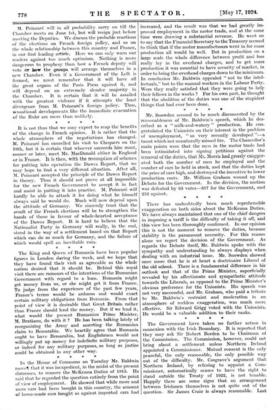In the House of Commons on Tuesday Mr. Baldwin moves
that it was inexpedient, in the midst of the present distresses, to remove the McKenna Duties of 1915. He said that he regarded the question entirely from the point of view of employment. He showed that while more and more cars had been bought in this country, the amount of home-made cars bought as against imported cars had increased, and the result was that we had greatly im- proved employment in the motor trade, and at the same time were drawing a substantial revenue. He went on to say that the Financial Secretary to the Treasury seemed to think that if the motor manufacturers went in for mass production all would be well. But in production on a large scale the whole difference between profit and loss really lay in the overhead charges, and to get mass production it was essential to have security of market, in order to bring the overhead charges down to the minimum. In conclusion Mr. Baldwin appealed " not to the intel- lectuals," but to the manual workers in the Labour Party. Were they really satisfied that they were going to help their fellows in the works ? For his own part, he thought that the abolition of the duties was one of the stupidest things that had ever been done.
* *


















































 Previous page
Previous page